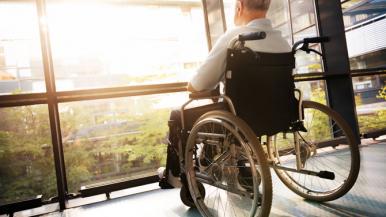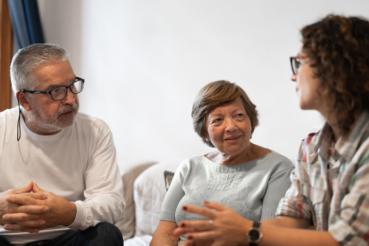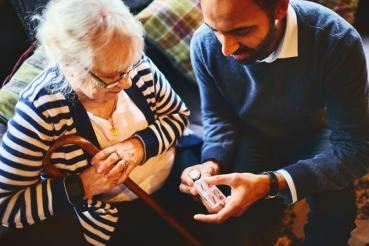The National Council on Aging estimates that 1 in 10 Americans over the age of 60 has been the victim of elder abuse.
“It’s not only physical abuse that’s a problem,” says Rush geriatrician Edward Gometz, MD. “We see many different types of abuse or mistreatment.”
How to recognize the signs of elder abuse
Although elder abuse can happen to anyone, people who suffer from dementia, depression, physical impairment or social isolation are most vulnerable.
These are the types of abuse, and possible signs that an older adult might be experiencing them:
- Psychological abuse: The older adult's caregiver or family members use intimidation, threats or verbal abuse.
- Sexual abuse: The older adult fears being touched.
- Neglect: The older adult's basic needs (bathing, eating, living in a safe environment) are going unmet, either because of self-neglect or caregiver neglect.
- Physical abuse: The older adult has unexplained bruises, cuts, rope burns or even fractures.
- Financial exploitation: The older adult is missing money, documents or belongings. Unlike other kinds of elder abuse, which are usually carried out by family members or caregivers, financial exploitation often comes at the hands of people who don't know the victims.
“We’re able to screen for physical and sexual abuse pretty readily in the clinic setting,” says Gometz, who watches closely for potential signs of abuse and neglect — such as bruising, skin breakdown, poor personal hygiene and recurrent urinary tract infections — even when those issues aren’t what has brought a patient to see him.
“From the moment a patient walks in, no matter what they’ve come in for, I’m looking at everything from how they’re dressed to how they’re taking care of themselves to whether they have any unusual bruising,” Gometz says. “Falls can happen a lot with older patients, but you wonder about unusual bruising that doesn’t seem to correlate with a fall, especially along the arms and hands. Or if someone seems disheveled, that can certainly happen with cognitive impairment, but it also makes me wonder about the role the person’s caretaker is playing.”
If you have an older family member or friend who lives in a care facility, Gometz recommends being alert to subtle signs like their acting withdrawn or less communicative than usual. Victims of mistreatment or abuse can be afraid to speak up, either because they’re afraid of retaliation or because they don’t want to get a caregiver in trouble.
Gometz says that he asks gentle, open-ended questions (e.g., “Do you feel safe where you live?” or “Are there any people you don’t like?”) to try to figure out what’s going on, a technique he recommends to family members who think direct questions might cause their loved one to shut down. He also recommends talking with your loved one’s physician about any suspicions, so they can be extra alert during exams.
Scams, fraud and financial abuse
Fear of speaking up can be even more pronounced when the abuse takes the form of financial exploitation, which happens when an abuser manipulates someone to get access to their money, property or other assets. People are often embarrassed when this happens and don’t want to tell anyone about it.
“Financial exploitation is a problem that we’re having a lot of difficulty getting our hands around,” Gometz says, adding that it can involve family members or caregivers stealing money or forging signatures — but can also include phone calls, letters or emails that claim to be from the IRS or Social Security Administration, or from people who say you’ve won a lottery or other prize.
“My own mom has been getting scam letters in the mail that are made to look like they come from a government agency,” he says, and recommends that caregivers go through the mail with older loved ones and flag items that seem shady. “Also, be sure they know never to give out information over the phone. No government agency will ever call you asking for your Social Security number or other sensitive info.”
“Scammers are always finding new and innovative ways to get to older people, especially those who aren’t as savvy with technology,” Gometz continues, adding that his patients have been sold everything from fraudulent Medicare supplements to unnecessary home repairs and car warranties. It’s important to follow your instincts and talk to someone you trust if your loved one is evasive about finances, money is missing or something just doesn’t feel right.
What to do if you or someone you love needs help
Gometz emphasizes that your physician, or your loved one’s physician, is a safe person to talk with about any kind of issue — and even if you have someone accompanying you to an appointment, you should never hesitate to ask your doctor to talk in private if you’d prefer that the other person not hear your concerns.
If you are experiencing abuse — or suspect someone you know might be experiencing it — talk to your doctor or use one of the following numbers:
- You can request a free senior well-being check from the City of Chicago, for yourself or someone else, by visiting 311.chicago.gov or calling 311.
- Illinois operates a free elder abuse hotline at (866) 800-1409 (voice) or (888) 206-1327 (TTY). You can stay anonymous when you call.




